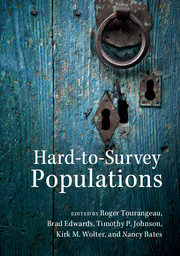Book contents
- Frontmatter
- Dedication
- Contents
- List of figures
- List of tables
- List of boxes
- List of contributors
- Preface
- Part I Introduction
- Part II Conducting surveys in difficult settings
- Part III Conducting surveys with special populations
- 11 Representing the populations: what general social surveys can learn from surveys among specific groups
- 12 Surveying cultural and linguistic minorities
- 13 Challenges to surveying immigrants
- 14 Ethnographic evaluations on coverage of hard-to-count minorities in US decennial censuses
- 15 Methodological and ethical issues arising in carrying out research with children and young people
- 16 Challenges in the first ever national survey of people with intellectual disabilities
- 17 Conducting research on vulnerable and stigmatized populations
- 18 Surveying political extremists
- Part IV Sampling strategies for the hard to survey
- Part V Data collection strategies for the hard to survey
- Index
- References
16 - Challenges in the first ever national survey of people with intellectual disabilities
Published online by Cambridge University Press: 05 September 2014
- Frontmatter
- Dedication
- Contents
- List of figures
- List of tables
- List of boxes
- List of contributors
- Preface
- Part I Introduction
- Part II Conducting surveys in difficult settings
- Part III Conducting surveys with special populations
- 11 Representing the populations: what general social surveys can learn from surveys among specific groups
- 12 Surveying cultural and linguistic minorities
- 13 Challenges to surveying immigrants
- 14 Ethnographic evaluations on coverage of hard-to-count minorities in US decennial censuses
- 15 Methodological and ethical issues arising in carrying out research with children and young people
- 16 Challenges in the first ever national survey of people with intellectual disabilities
- 17 Conducting research on vulnerable and stigmatized populations
- 18 Surveying political extremists
- Part IV Sampling strategies for the hard to survey
- Part V Data collection strategies for the hard to survey
- Index
- References
Summary
Introduction and background
The population of adults with intellectual disabilities has been largely neglected in survey research, as the significant impairments in communication and understanding that are common among this population were considered too great a barrier to their participation in large-scale surveys. While there had been qualitative research, prior to 2002 there had never been a nationally representative survey conducted with this population. In surveys concerning this population, data was largely collected from proxy respondents, such as parents or caregivers. In the absence of a sampling frame for the whole population, surveys generally used convenience samples of those in touch with services.
In March 2001, the UK government White Paper Valuing People: A New Strategy for Learning Disability for the 21st Century (Department of Health, 2001) was published, setting out the Government’s commitment to improving the life chances of people with intellectual disabilities in England. This was the first White Paper in thirty years concerning this population, and there had been a significant amount of change in service provision in that time. One important issue highlighted in the White Paper was the lack of national information available for England about people with intellectual disabilities, with much information based on estimates from administrative data, in the absence of survey research.
- Type
- Chapter
- Information
- Hard-to-Survey Populations , pp. 347 - 367Publisher: Cambridge University PressPrint publication year: 2014
References
- 3
- Cited by



